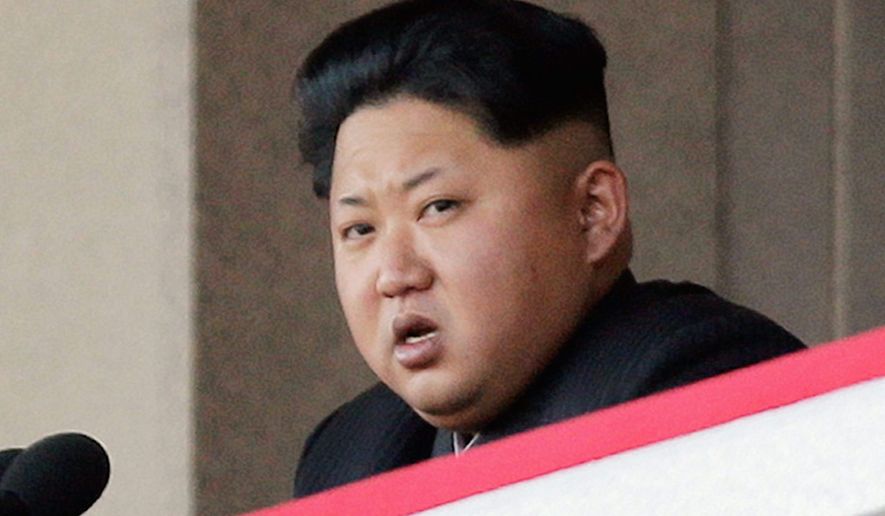OPINION:
Communist China, its banks and some creative flexing of U.S. financial muscle are the answer.
The question is how to deal with Kim Jong-un and not have a lot of dead and maimed South Koreans as collateral damage.
True, China has stopped buying the North Korean coal that has helped keep food on Mr. Kim’s table and fuel and parts in his fission and ballistic factories. But that’s not enough of a money squeeze to get the job done.
Much more effective would be Beijing’s freezing all Chinese bank and other dollar transactions with Pyongyang (“pea-on-yang,” for those who came in late).
The banks’ changing virtually worthless paper money into dollars for Mr. Kim is how he gets the cash to finance his highest desideratum: building and launching something someday that will actually hit a target instead of blowing up in his face on every lift-off.
Case in point: Sunday’s South Korean submarine-launched missile barely cleared the water’s surface before it blew itself to smithereens. (I couldn’t discuss even if I knew — I don’t — whether it was bad luck, the usual faulty manufacture or some U.S. military-intelligence techie pressing a button to blow the thing up.)
President Trump and communist China’s President Xi Jinping (Mr. Trump’s new best bud) have already agreed that Mr. Xi’s our main man when it comes to instantly raising a great wall to block Mr. Kim’s long stumble toward nuclear stardom.
Now Vice President Mike Pence, on his visit to Seoul, has warned Pyongyang not to mess with American firepower because the “era of strategic patience is over.”
Fair enough, but not enough to stop the North’s Little Maximum Leader for Life.
Actually, President Obama did some quiet cyber messing with Mr. Kim’s bumbling ballistic launch attempts. But no American president has stopped, let alone turned around, the communist North’s missile mission. Doing so isn’t all that easy, not by a — pardon the expression — long shot.
Military analysis say any U.S. strike against Mr. Kim’s air defenses and nukes would trigger instant artillery retaliation across the demilitarized zone. Not nice to contemplate. In contrast with their brothers and sister in the North, all of South Korea’s 50 million citizens do live in freedom, but half of them also live in the Seoul-Incheon region, only 35 miles south of the demilitarized zone.
Squinting north across the DMZ on Monday, Mr. Pence did not glimpse Mr. Kim, who apparently wasn’t up for a photo op. Perfectly understandable. For him, every day is a bad hair day.
No problem for our team. What we need to see is not Mr. Kim’s kisser but some sustained Sino-U.S. cooperation on the matter of shutting down banks doing business with Mr. Kim.
“If China does cut off all transactions with North Korea, we’ll be in a position where once again the dictator will not be able to pay his generals,” Chairman Ed Royce told Jake Tapper on CNN’s State of the Union on Sunday. “That’s what happened the last time we had these kinds of sanctions imposed on Chinese banks — some 10 banks — back during Banco Delta Asia.”
Mr. Royce referred to the U.S. Treasury’s virtually muscling shut, during President George W. Bush’s second term, an obscure bank in a tiny, somewhat seedy autonomous place called “Macao,” on China’s southern coast. The little bank had outsized importance for North Korea’s hard currency needs.
You have to think that Mr. Trump and Treasury Secretary Steven Mnuchin cotton to the Royce idea for using the considerable financial clout of the United States and of China to squeeze the hard-currency life out of Mr. Kim’s thermonuclear march — let’s be clear, we mean strangle them to death, not temporary incapacitate.
Mr. Royce said he and Rep. Elliot Engel of New York, the committee’s ranking Democratic member, are sponsoring a bill to “go with third-party sanctions on some additional financial institutions worldwide.” The point, he said, is to “cut off the ability of North Korea to use what’s called slave labor.”
The California congressman said such labor is really what amounts to North Koreans working like indentured servants in neighboring states, where they send money back to North Korea.
“We are looking at shutting off every dime of money that goes in there,” he said. Why? “Because it’s very expensive” to run a nuclear bomb and ballistic missile program like Mr. Kim’s.
If Mr. Kim “cannot pay for the foreign parts and if you get the cooperation from China, you can shut it down,” Mr. Royce said.
Mere containment of a nuclear North Korea — no; roll back — yes.
• Ralph Z. Hallow, chief political writer at The Washington Times, has covered Washington since 1982.




Please read our comment policy before commenting.